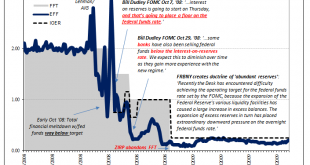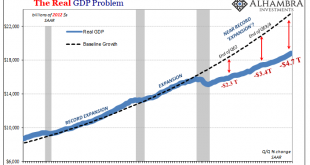Keith gave a keynote address—the only speaker with an hour to cover his topic—at the Gold and Alternative Investments Conference in Sydney on Saturday. Said topic was the nature of money. “Money is a matter of functions four: a medium, a measure, a standard, a store.” Most of the talk was structured around discussing these functions. Medium is pretty obvious: the dollar is the universal medium of exchange. It is basically frictionless, trading at zero spread (with...
Read More »Motte and Bailey Fallacy, Report 13 Oct
This week, we will delve into something really abstract. Not like monetary economics, which is so simple even a caveman can do it. A Clever Ruse We refer to a clever rhetorical trick. It’s when someone makes a broad and important assertion, in very general terms. But when challenged, the assertion is switched for one that is entirely uncontroversial but also narrow and unimportant. The trick is intended to foreclose debate of the broad assertion, not really to...
Read More »More Than A Decade Too Late: FRBNY Now Wants To Know, Where Were The Dealers?
I’ve said it all along; focusing in on bank reserves would leave you dazed and confused. It’s just not how the system works. After all, as I pointed out again not long ago, “our” glorious central bank had the audacity to claim that there were “abundant” reserves during the worst financial panic in four generations. “Somehow” despite that, it was a Global Financial Crisis that lived up to its name – global. Straight away you have to ask, what good are reserves if...
Read More »“On the Equivalence of Private and Public Money,” JME, 2019
Journal of Monetary Economics, with Markus Brunnermeier. PDF. When does a swap between private and public money leave the equilibrium allocation and price system unchanged? To answer this question, the paper sets up a generic model of money and liquidity which identifies sources of seignorage rents and liquidity bubbles. We derive sufficient conditions for equivalence and apply them in the context of the “Chicago Plan”, cryptocurrencies, the Indian de-monetization experiment, and Central...
Read More »“On the Equivalence of Private and Public Money,” JME, 2019
Accepted for publication in the Journal of Monetary Economics, with Markus Brunnermeier. (NBER wp.) When does a swap between private and public money leave the equilibrium allocation and price system unchanged? To answer this question, the paper sets up a generic model of money and liquidity which identifies sources of seignorage rents and liquidity bubbles. We derive sufficient conditions for equivalence and apply them in the context of the “Chicago Plan”, cryptocurrencies, the Indian...
Read More »Libra
In the FT, Hannah Murphy reports about Facebook’s launch of Libra. Lots of skepticism in the comments section. And Hannah Murphy reports that [p]ositive Money, a consumer campaign group, attacked the proposal. “Our money is increasingly in the hands of a small number of banks and payment companies, and we should avoid ceding further control to unaccountable corporate interests. Facebook’s plans pose alarming implications for privacy and power in the economy,” said David Clarke, the head...
Read More »The Elephant in the Gold Room, Report 16 June
We will start this off with a pet peeve. Too often, one is reading something about gold. It starts off well enough, discussing problems with the dollar or the bond market or a real estate bubble… and them bam! Buy gold because the dollar is gonna be worthless! That number again is 1-800-BUY-GOLD or we have another 1-800-GOT-GOLD in case the lines on the first number are busy! Whether the writer is a bullion dealer, or...
Read More »“On the Equivalence of Private and Public Money,” CEPR, 2019
CEPR Discussion Paper 13778, June 2019, with Markus Brunnermeier. PDF. (Local copy of NBER wp.) We develop a generic model of money and liquidity that identifies sources of liquidity bubbles and seignorage rents. We provide sufficient conditions under which a swap of monies leaves the equilibrium allocation and price system unchanged. We apply the equivalence result to the “Chicago Plan,” cryptocurrencies, the Indian de-monetization experiment, and Central Bank Digital Currency (CBDC). In...
Read More »“On the Equivalence of Private and Public Money,” NBER, 2019
NBER Working Paper 25877, May 2019, with Markus Brunnermeier. PDF. (Local copy.) We develop a generic model of money and liquidity that identifies sources of liquidity bubbles and seignorage rents. We provide sufficient conditions under which a swap of monies leaves the equilibrium allocation and price system unchanged. We apply the equivalence result to the “Chicago Plan,” cryptocurrencies, the Indian de-monetization experiment, and Central Bank Digital Currency (CBDC). In particular, we...
Read More »Proposed Negative Rates Really Expose The Bond Market’s Appreciation For What Is Nothing More Than Magic Number Theory
By far, the biggest problem in Economics is that it has no sense of itself. There are no self-correction mechanisms embedded within the discipline to make it disciplined. Without having any objective goals from which to measure, the goal is itself. Nobel Prize winning economist Ronald Coase talked about this deficiency in his Nobel Lecture: This neglect of other aspects of the system has been made easier by another...
Read More » Swiss Economicblogs.org
Swiss Economicblogs.org





